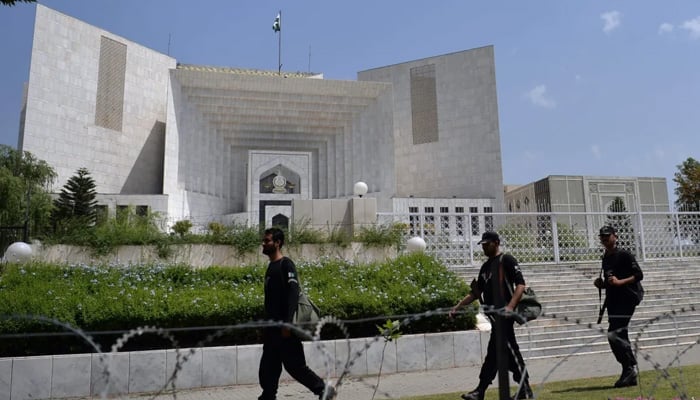Mehr will have to be paid whenever wife demands: SC
Court directed if Mehr and said costs were not paid, family court should execute order, which might include attachment of properties of petitioner
ISLAMABAD: The Supreme Court (SC) observed on Wednesday that Mehr (dower) is an Islamic concept and specifically recognised by the law of Pakistan, hence the entire amount of dower would be payable on wife’s demand if any period was not specified in the Nikahnama or marriage contract.
A three-member SC bench, headed by Chief Justice Qazi Faez Isa, issued a written order in an appeal, filed by one Khalid Pervez against a decision of the Lahore High Court on May 24, 2023 regarding payment of Mehr (dower). The court dismissed the appeal, upheld the LHC decision, and imposed compensatory costs to the extent of Rs100,000 on the petitioner, considering decrease in the value of money.
The court directed that if Mehr and the said costs were not paid, the family court should execute the order, which might include the attachment of the properties of the petitioner. It held that Mehr is an Islamic concept, mentioned in the Holy Quran, (An-Nisa verse 4 and Al-Baqrah verses 236-7) and it is specifically recognised under Section 2 of the Muslim Personal Law (Shariat) Application Act, 1962. Mehr has to be paid whenever demanded by the wife.
The court noted that Section 10 of The Muslim Family Laws Ordinance, 1961 stipulates that: “Where no details about the mode of payment of dower are specified in the Nikahnama, or the marriage contract, the entire amount of the dower shall be prescribed to be payable on demand.” The Supreme Court cited the case of one Syed Muhammad vs Mst. Zeenat (PLD 2001 SC 128) wherein the SC held that, Mehr can be demanded during the subsistence of the marriage, and that the husband is under an obligation to pay it.
The impugned judgment accords with the law and the counsel had not been able to point out any illegality therein. During the proceedings, the court noted that the petitioner had two wives, but the petitioner did not fulfil his obligations towards his wife Samina when he failed to pay the Mehr demanded by her. The court noted that Samina had to file a suit for recovery of the Mehr and maintenance, and the petitioner unnecessarily involved her in litigation, which reached this [Supreme] Court after six-and-a-half years.
“This kind of frivolous litigation is paralysing the judicial system of Pakistan,” says the written order, adding that the petitioner took up an untenable defence, and perpetuated it probably because costs were not imposed upon him and the courts did not insist that the decision of the Family Court should first be complied with before entertaining a challenge to it.
-
 Selma Blair Explains Why Multiple Sclerosis 'isn't So Scary'
Selma Blair Explains Why Multiple Sclerosis 'isn't So Scary' -
 Will Smith Surprises Wife Jada Pinkett With Unusual Gift On Valentine's Day
Will Smith Surprises Wife Jada Pinkett With Unusual Gift On Valentine's Day -
 Shamed Andrew Has Paid Royal Favours With ‘national Scandal’
Shamed Andrew Has Paid Royal Favours With ‘national Scandal’ -
 Prince William Ticked Off By How Andrew ‘behaved With Staff’
Prince William Ticked Off By How Andrew ‘behaved With Staff’ -
 Prince William Questions Himself ‘what’s The Point’ After Saudi Trip
Prince William Questions Himself ‘what’s The Point’ After Saudi Trip -
 James Van Der Beek's Friends Helped Fund Ranch Purchase Before His Death At 48
James Van Der Beek's Friends Helped Fund Ranch Purchase Before His Death At 48 -
 King Charles ‘very Much’ Wants Andrew To Testify At US Congress
King Charles ‘very Much’ Wants Andrew To Testify At US Congress -
 Rosie O’Donnell Secretly Returned To US To Test Safety
Rosie O’Donnell Secretly Returned To US To Test Safety -
 Meghan Markle, Prince Harry Spotted On Date Night On Valentine’s Day
Meghan Markle, Prince Harry Spotted On Date Night On Valentine’s Day -
 King Charles Butler Spills Valentine’s Day Dinner Blunders
King Charles Butler Spills Valentine’s Day Dinner Blunders -
 Brooklyn Beckham Hits Back At Gordon Ramsay With Subtle Move Over Remark On His Personal Life
Brooklyn Beckham Hits Back At Gordon Ramsay With Subtle Move Over Remark On His Personal Life -
 Meghan Markle Showcases Princess Lilibet Face On Valentine’s Day
Meghan Markle Showcases Princess Lilibet Face On Valentine’s Day -
 Harry Styles Opens Up About Isolation After One Direction Split
Harry Styles Opens Up About Isolation After One Direction Split -
 Shamed Andrew Was ‘face To Face’ With Epstein Files, Mocked For Lying
Shamed Andrew Was ‘face To Face’ With Epstein Files, Mocked For Lying -
 Kanye West Projected To Explode Music Charts With 'Bully' After He Apologized Over Antisemitism
Kanye West Projected To Explode Music Charts With 'Bully' After He Apologized Over Antisemitism -
 Leighton Meester Reflects On How Valentine’s Day Feels Like Now
Leighton Meester Reflects On How Valentine’s Day Feels Like Now




